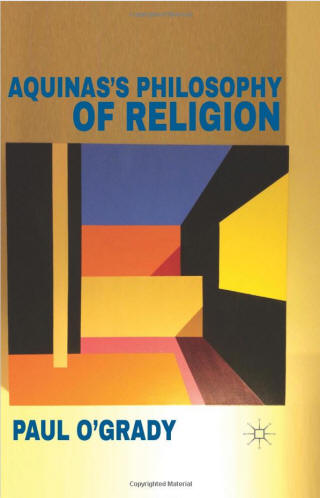Book Review
Aquinas's Philosophy of Religion
Paul O'Grady
Palgrave Macmillan
ISBN 978-0-28517-0
 In
this very readable work, the philosophical contribution of Aquinas is
examined. This include his studies on faith and reason as well as his
famous arguments for the existence of God. The arguments from motion,
contingency and design are looked at in particular detail.
In
this very readable work, the philosophical contribution of Aquinas is
examined. This include his studies on faith and reason as well as his
famous arguments for the existence of God. The arguments from motion,
contingency and design are looked at in particular detail.
For the purposes of this review, I will examine the author's discussion of Aquinas and the problem of evil. The author notes that G E Moore made canonical the naturalistic fallacy: that the moral realm and the realm of facts about the world are quite distinct. However, Aquinas's account of goodness does what Moore thought was impossible: he argues that goodness can be explicated by its relationship to being, that goodness is connected to facts about reality.
A thing insofar as it exists is good according to Aquinas. Evil is a privation of being. The author makes clear that there is a difference between privation and absence. Evil is not simply an absence but a malfunction of something which is good.
The author points out that a feature of Aquinas's understanding of evil is that evil is a necessary part of the kind of world we live in. The evils in the world are parasitic of goodness and can ultimately be brought to achieve goodness. While we have no choice about the ultimate end of our action ( "we are hardwired for happiness"), we do have free choice about how we achieve the end. We can make bad choices by either an incorrect apprehension of the good or by weakness of will.
The author goes on to point out that for Aquinas God is causally responsible for the natural evil in the world. Nevertheless, free creatures are responsible for moral evil. God does not will moral evil not to be. But this does not mean that God wills moral evil to be. He allows us free choice and so while God is causally active in the immoral act, God is not the cause of evil.
This is a really well argued case in defence of Aquinas's philosophy of religion.
REVIEWED BY DR PRAVIN THEVATHASAN
